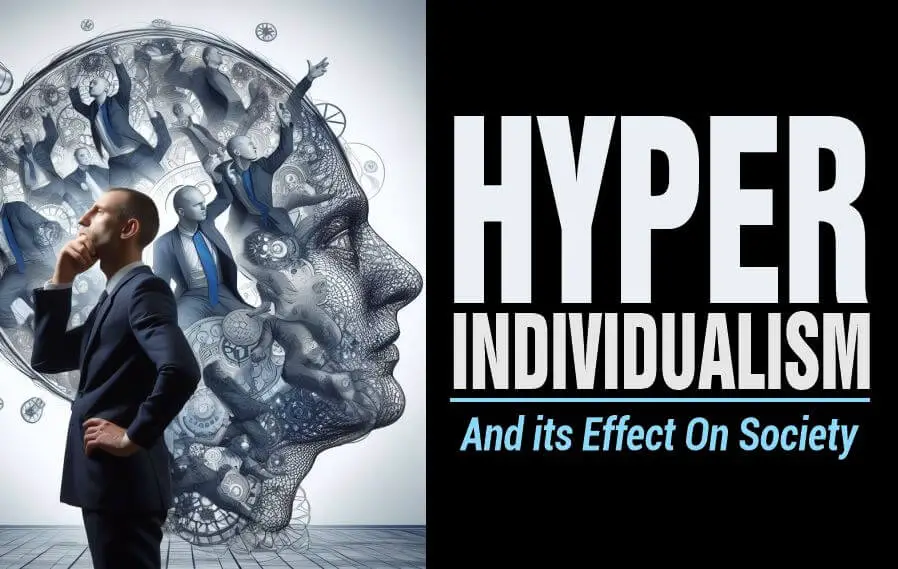Hyper individualism is a social phenomenon of a state of mind where you think the world revolves around you, pitching you against the collective group.
Also called radical individualism or extreme individualism, this trend has shaped contemporary society, promoting autonomy and self-expression.
However, critics argue that radical individualism has led to a disintegration of social bonds and a decline in community cohesion.
The effects of this individualistic mindset can be seen in rising levels of loneliness, decreased trust in institutions, and increased social inequality.
Understanding the impact of hyper individualism on society is crucial to addressing the challenges it presents and encouraging a sense of interconnectedness and collective responsibility.
What is Hyper Individualism?
Hyper Individualism Definition
Hyper individualism refers to an extreme emphasis on individual autonomy, self-interest, and personal fulfillment, often at the expense of collective well-being and social cohesion.
It is characterized by a strong belief in personal freedom, self-reliance, and the pursuit of individual goals and desires, without much consideration for the impact on others or the larger community.
It can lead to a sense of isolation, disconnection, and a breakdown of social bonds.
Also, it often manifests in behaviours such as excessive self-promotion, prioritizing personal success over collective progress, and a lack of empathy towards others.
Related: Understanding the Individualistic Culture
Difference between Hyper individualism, Individuality and Rugged individualism

As described above, hyper individualism is an extreme emphasis on your needs as an individual – your desires, and rights, even at the expense of others or societal well-being.
It often involves an excessive focus on personal fulfillment and self-interest, disregarding social responsibilities or collective goals.
Extreme individualism can lead to a lack of empathy, community fragmentation, and a disregard for the common good.
Individuality, on the other hand, is the unique characteristics, qualities, or attributes that make a person distinct from others.
It recognizes and values the diversity of individuals and promotes the idea that everyone should be able to express their authentic selves.
Individuality celebrates personal autonomy and allows people to make choices and pursue their own interests within the bounds of social norms and ethical principles.
Rugged individualism specifically refers to a concept rooted in American culture, particularly during the country’s expansion westward.
It emphasizes self-reliance, independence, and resilience in the face of challenges or adversity.
Rugged individualism encourages you to take initiative, work hard, and achieve success through personal effort, often without expecting assistance or intervention from others or the government.
While rugged individualism shares some similarities with hyper individualism and individuality, it has a distinct focus on self-sufficiency and resilience that can sometimes downplay the importance of broader social connections and the collective good.
Additionally, rugged individualism often idealizes a particular kind of individualistic success that may overlook the systemic barriers that limit opportunities for some individuals.
Related: 20 Characteristics Of A Collectivist Culture
Historical Context and Development of Hyper Individualism
The historical context of hyper individualism can be traced back to the Enlightenment period in the 18th century.
During this time, there was a significant shift in Western thought towards valuing reason, science, and human rights.
Philosophers such as John Locke and Jean-Jacques Rousseau advocated for the autonomy and liberty of individuals, challenging the prevailing systems of monarchy and aristocracy that heavily restricted personal freedom.
This philosophical foundation laid the groundwork for the emergence of liberal democracy in the 19th and 20th centuries.
Industrial Revolution
The Industrial Revolution and the rise of capitalism further reinforced individualism, as economic systems became more geared towards private property, personal gain, and competition.
With the advent of industrialization, mass production, and urbanization, individuals’ opportunities and freedoms expanded.
The belief in self-reliance and personal success became deeply ingrained in the Western cultural psyche.
Throughout the 20th century, several factors contributed to the development of radical Individualism.
The Rise of Consumerism
The rise of consumerism and the growth of the middle class led to a greater focus on personal desires and material comfort.
The expansion of media and communications technology provided individuals with endless choices and possibilities, reinforcing the notion of individualism as a means of self-fulfillment.
The upheavals of the 1960s, such as the civil rights movement, second-wave feminism, and the counterculture movement, challenged traditional social norms and hierarchies, encouraging a sense of personal freedom and self-expression.
These movements, while aiming to promote equality and empower marginalized groups, also gave rise to an extreme version of individualism, where personal desires and identities took precedence over collective goals.
Related: Merits and Demerits of Living in a Collectivist Culture
In Recent Decades
In recent decades, globalization, advancements in technology, and the erosion of traditional social structures have further intensified hyper individualism.
The spread of neoliberal economic policies has reinforced the idea that personal success and individual choices are the primary factors in determining one’s well-being and social status.
Additionally, the rise of social media and digital technology has led to increased self-curating and self-presentation, where individuals can easily create and project their desired identities to a wide audience.
This sense of personal identity and self-importance, along with the growing competition for attention and recognition, has further contributed to the development of hyper individualism.
However, as we are going to see further down in this article, hyper individualism is not without its critics and challenges.
Critics argue that it can lead to social fragmentation, isolation, and the erosion of communal values and solidarity.
They emphasize the importance of balancing individual rights and autonomy with responsibilities towards the collective well-being and the common good.
Also Read: Individuality vs Collectivism
Prevalence of Hyper Individualism in Contemporary Society

The prevalence of hyper individualism in contemporary society has to do with the growing emphasis and prioritization of individual rights, desires, and needs above collective or communal interests.
The Rise of Capitalism
Firstly, the rise of capitalism and globalization has contributed to the prevalence of this phenomenon.
As societies become more market-oriented, there is a greater emphasis on competition, personal achievement, and financial success.
This capitalist mindset encourages a culture where you as and individual are encouraged to pursue your own interests and maximize your personal happiness without much consideration for the collective well-being.
Related: Overcoming Individuality Complex
Advances in Technology
Secondly, advances in technology and communication have played a significant role in the promotion of extreme individualism.
With the advent of social media and online platforms, individuals can curate and display their lives to a global audience.
This constant self-presentation can create a perception of constant self-improvement and individual success, enhancing a culture of self-centeredness.
Erosion of Traditional Social Structures
Moreover, the erosion of traditional social structures and institutions, such as extended families, religious communities, and labour unions, has weakened collective identities and communal ties.
As a result, there is a greater reliance on individuals to shape their own lives and fulfill their own needs, further reinforcing radical individualism.
Additionally, the emphasis on human rights and individual freedoms in contemporary discourse has contributed to the prevalence of hyper individualism.
While the protection of individual rights is essential for a fair and equitable society, an extreme focus on individual liberties can overshadow collective responsibilities.
This excessive prioritization of individual rights can lead to a lack of empathy and collective action, as people become more self-centered and less invested in the well-being of their communities.
Hyper Individualism in America
Hyper individualism in America is the extreme emphasis on individualism and personal autonomy in American society.
This ideology values personal freedom, independence, and the pursuit of self-interest above collective goals or societal cohesion.
There are several factors that contribute to hyper individualism in America:
Historical Factors: The founding principles of the United States, such as the pursuit of happiness and individualism, are deeply ingrained in the American identity. The spirit of independence and self-reliance has been nurtured since the country’s inception.
Capitalism and the Free Market: America’s economic system encourages competition and self-interest. The pursuit of wealth and material possessions is often seen as a measure of success, reinforcing the importance of individual accomplishment and personal ambition.
Cultural Values: American culture places a high value on personal freedoms, self-expression, and personal choice. The ideal of “rugged individualism” celebrates those who overcome adversity through their own efforts and perseverance.
Social and Political Ideologies: Concepts such as limited government intervention, individual rights, and personal liberty are deeply rooted in American political discourse. These ideologies reinforce the idea that individuals should have maximum autonomy and minimal interference from the state.
Media and Popular Culture: American media often promotes and celebrates self-made individuals, highlighting stories of success and personal achievement. This constant exposure to narratives of individual triumph can reinforce the importance of personal autonomy and the pursuit of individual goals.
Pros and Cons of Hyper Individualism
Pros
Freedom of Choice: Radical individualism allows individuals to have the freedom to choose their own path and make decisions according to their own desires. This can include career choices, relationships, lifestyle preferences, and personal beliefs.
Self-expression: Extreme individualism promotes the expression of your uniqueness and identity. It encourages you to embrace your personal style, interests, and talents without conforming to societal norms or expectations.
Innovation and Progress: It cultivates a culture of competition, which can lead to innovation and progress in various fields. When you are motivated to excel and stand out, you may push boundaries and find new solutions to problems.
Personal Growth and Empowerment: Hyper individualism emphasizes personal growth and self-realization. People who prioritize their own needs and goals tend to focus on self-improvement, leading to a sense of empowerment and fulfillment.
Cons
Limited Sense of Community and Connection: Radical individualism can lead to a breakdown in social bonds and a lack of community involvement. When everyone is focused on their own individual success, there may be a diminished sense of belonging and solidarity.
Increased Inequality: Extreme individualism can exacerbate inequalities in society. The pursuit of self-interest often prioritizes personal gain over the well-being of others, leading to disparities in resources, opportunities, and outcomes.
Lack of Collaboration and Teamwork: The extreme focus on individual success can hinder collaboration and teamwork. In certain contexts, such as the workplace or group projects, extreme individualism may lead to a lack of cooperation and communication, hindering overall productivity and progress.
Mental Health Issues: The pressure to constantly prioritize personal success and meet societal expectations can lead to increased stress, anxiety, and mental health issues. The emphasis on individual achievement can create a sense of constant comparison, lowering self-esteem and exacerbating feelings of isolation or loneliness.
Influence of Hyper Individualism on Mental Health and Well-being
One of the main pressures associated with hyper individualism is the constant drive for self-perfection and comparison.
Individuals often feel compelled to achieve high levels of success and display themselves as flawless.
This pressure can lead to increased rates of anxiety and depression as people constantly strive for unattainable ideals.
Comparing oneself to others can also negatively impact self-esteem and self-worth, as individuals may constantly feel inadequate or inferior.
Radical individualism often results in reduced empathy and a decreased sense of social responsibility.
When people prioritize their own needs and desires above all else, they become less attuned to the needs and experiences of others.
This can lead to apathy towards societal issues and inequality, as individuals become more focused on their personal achievements rather than working towards collective progress.
This lack of empathy and social responsibility can contribute to a less compassionate society and perpetuate harmful behaviors and attitudes.
Hyper Individualism Trauma

Hyper individualism trauma refers to the negative consequences that arise from a society or culture that excessively emphasizes individual independence and self-reliance.
It suggests that the intense focus on individual success and fulfillment can lead to feelings of isolation, disconnection, and inadequacy when individuals struggle to meet unrealistic expectations or face challenges beyond their control.
This form of trauma can result in mental health issues, such as anxiety, depression, and a lack of social support, as individuals may feel hesitant to seek help due to societal pressure to handle problems on their own.
Additionally, hyper individualism trauma can contribute to a lack of community cohesion and empathy, as people may prioritize their own needs and desires over collective well-being.
Economic and Political Implications of Radical Individualism
Radical individualism has significant economic and political implications. It can shape consumer culture by prioritizing personal success and material possessions.
This, in turn, influences market dynamics and increases the emphasis on catering to individual desires.
Politically, radical individualism can lead to the rise of libertarianism and limited government interference, potentially challenging social welfare programs and shifting the focus towards individual responsibility.
Let’s take a look:
Individualistic Consumer Culture
Radical individualism places a strong emphasis on personal success and material possessions.
This can lead to a consumer culture in which individuals prioritize their own desires and preferences above collective needs.
In such a culture, the pursuit of personal wealth and material goods becomes a central focus, often leading to increased consumption and a greater demand for goods and services.
The economic implications of this individualistic consumer culture are significant.
The market dynamics are influenced by the preferences and choices of individuals, leading to a greater emphasis on catering to individual desires and increasing competition among businesses to satisfy consumer demands.
This can lead to a wider variety of products and services available on the market, as businesses strive to differentiate their offerings and attract consumers.
Additionally, the increased consumption driven by individualistic values can contribute to economic growth and stimulate the production of goods and services.
Societal Impact on Political Ideologies and Policies
Radical individualism can have a profound impact on political ideologies and policies within a society.
It can give rise to libertarianism, which advocates for limited government interference in individual affairs and promotes personal freedom and choice.
The emphasis on individual freedom and independence that comes with radical individualism can challenge traditional notions of social welfare programs and collective responsibility.
Advocates of extreme individualism argue that individuals should be responsible for their own well-being and that excessive government intervention can limit personal freedoms and hinder economic growth.
They may argue against extensive social welfare programs and support limited government intervention in areas such as healthcare, education, and income redistribution.
As a result, political policies may be influenced by these ideologies, leading to reduced government regulation and intervention in the economy, privatization of public services, and tax cuts to promote individual economic freedom and entrepreneurship.
However, this can also lead to potential challenges for social welfare programs, as the emphasis shifts towards individual responsibility and self-reliance.
Critics argue that this can exacerbate inequality and marginalize vulnerable populations who may rely on government support.
Cultivating a Balanced Approach to Hyper Individualism
Cultivating a balanced approach to extreme individualism involves finding a middle ground between promoting individuality and personal growth while also recognizing the importance of community and interconnectedness.
Encouraging Individuality Without Disregarding the Community
Promoting Self-expression and Personal Growth: It is important to encourage individuals to explore their unique talents, passions, and interests. This can be done through providing opportunities for self-expression, such as creative outlets or educational programs that cater to individual strengths.
Recognizing the Importance of Collectivism and Interconnectedness: While it is important to nurture individuality, it is equally crucial to recognize the role of community and interconnectedness in society. This can be done by promoting teamwork, collaboration, and empathy towards others. Emphasizing the value of collective efforts can help individuals understand the significance of their actions beyond their own personal interests.
Nurturing Empathy and Social Responsibility
Education and Awareness Campaigns: Educational institutions and community organizations can play a vital role in encouraging empathy and social responsibility. This can be achieved through targeted campaigns that raise awareness about social issues, teach empathy as a subjective skill, and promote a sense of responsibility towards others.
Encouraging a Sense of Shared Humanity: Encouraging individuals to recognize their shared humanity and common values can help in reducing the negative consequences of extreme individualism. This can be done through activities that bring diverse individuals together, enhancing understanding and empathy across different backgrounds, and promoting a sense of belonging and responsibility towards the wider community.
Conclusion
The discussed effects of hyper individualism on society reveal a troubling trend towards social fragmentation, increased inequality, and a lack of collective responsibility.
It is imperative that we adopt a balanced approach that acknowledges both individuality and the importance of a cohesive society.
This requires finding ways to encourage personal growth and success without sacrificing our collective responsibilities towards one another.
Additionally, continuous research and open discussions on the influence of radical individualism are essential in order to identify its long-term consequences and develop strategies to mitigate its negative impact.
Frequently Asked Questions
What is hyper individuation?
Extreme individuation refers to an intensified process of individual differentiation and self-expression, where individuals strive to assert their unique identities and distinctiveness.
What is a hyper individual?
A hyper individual is someone who strongly emphasizes their own autonomy, self-interest, and personal fulfillment, often at the expense of collective well-being and social cohesion.
What are the problems with hyper individualism?
The problems with hyper individualism include a breakdown of social bonds, increased isolation and loneliness, diminished empathy, and a focus on personal success over collective progress.
What are examples of individualism?
Examples of individualism include prioritizing personal goals and desires, valuing personal freedom and self-reliance, and emphasizing individual rights and autonomy over collective responsibilities.
References:
- https://brill.com/downloadpdf/book/9789004444836/BP000044.pdf
- https://restitutio.org/2016/05/17/hyper-individualism/
- https://benjweinberg.com/2023/06/02/the-case-against-hyper-individualism/
Pyo Merez (PsyD) is a distinguished adolescent and adult psychologist at the forefront of mental health advocacy.
With expertise in cognitive and developmental psychology, focusing on social relationships, cultural contexts, and individual differences, Pyo has dedicated his career to empowering adolescents and adults.
As a sought-after speaker and panelist, Pyo shares invaluable insights on issues affecting young people, contributing to a deeper understanding of mental health and well-being in today's society.

